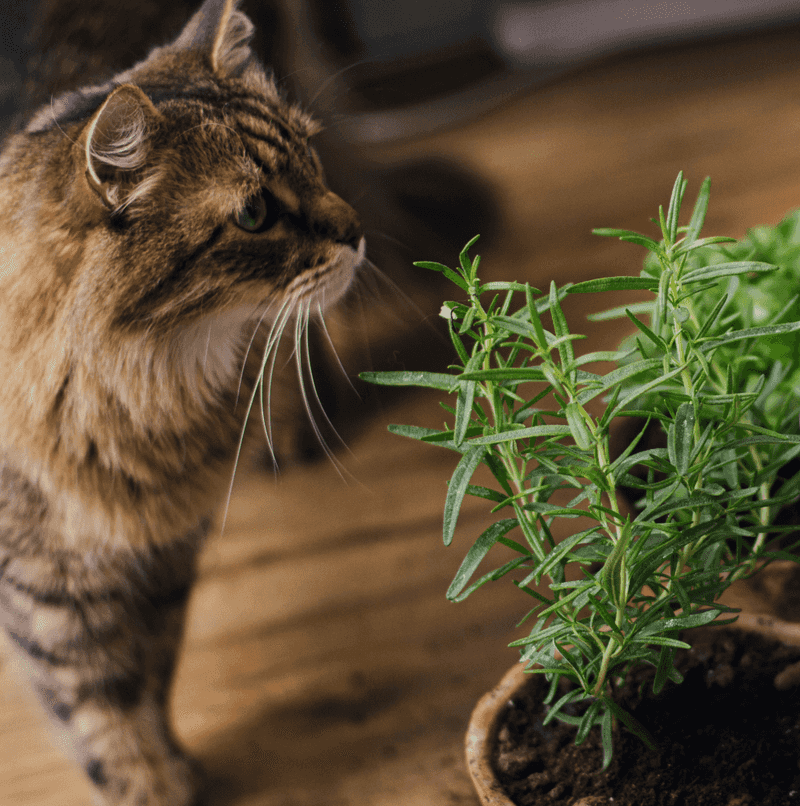My Cat Destroyed Every Plant I Had Until I Finally Found The One They Hate

My cat used to treat every plant in my home like a personal playground. No matter what I brought in, it ended up chewed, shredded, or knocked flat before the week was over. I tried moving pots, changing shelves, even buying heavier containers, but nothing slowed them down.
Then one day I brought home a rosemary, and to my surprise my cat took one sniff and backed away like it had seen a ghost. For the first time, a plant actually survived. That little discovery turned into the breakthrough I had been searching for.
The Smell Is Way Too Strong

Cats have noses that are about 14 times more sensitive than ours. Imagine smelling something pleasant but then multiplying that scent by a dozen. That’s what rosemary feels like to your cat.
The oils in rosemary create an overwhelming aroma that hits their delicate nose like a wall. While we might enjoy the fresh, piney scent in our kitchen, your cat experiences it as an intense assault on their senses. Keeping rosemary plants away from their favorite spots helps them feel more relaxed and comfortable around the house.
Natural Oils Irritate Their System

Rosemary contains essential oils like camphor and eucalyptol that don’t sit well with cats. Their bodies process these compounds differently than humans do, making even small amounts feel uncomfortable.
When cats brush against rosemary or sniff it closely, these oils can cause mild irritation to their skin and respiratory system. You might notice your cat sneezing or rubbing their face after getting too close. This natural defense mechanism tells them to stay away, protecting them from potential tummy troubles or breathing issues that could develop from prolonged exposure.
It Messes With Their Hunting Instincts

Cats rely heavily on their sense of smell to hunt and navigate their world. Strong scents like rosemary can actually interfere with their ability to pick up on other important smells around them.
When rosemary is nearby, it masks the subtle scents your cat uses to track prey or detect changes in their environment. This feels disorienting and frustrating for them, like trying to listen to music with someone shouting in your ear. Your cat naturally avoids rosemary to keep their sensory abilities sharp and their hunting game strong, even if they’re just stalking toy mice.
The Texture Feels Uncomfortable

Have you ever touched a rosemary plant? Those needle-like leaves aren’t exactly soft and inviting. Cats prefer soft, smooth surfaces when they rub against things to mark their territory.
Rosemary’s spiky texture feels prickly and unpleasant against their sensitive skin and whiskers. When cats investigate plants, they often use their face and body to explore, but rosemary’s rough leaves make this an uncomfortable experience. The physical sensation alone is enough to make most cats think twice before getting close, even without considering the smell. It’s simply not a pleasant tactile experience for them.
Bitter Taste Keeps Them Away

Cats are curious creatures who sometimes nibble on plants, but rosemary’s bitter taste quickly teaches them to avoid it. Unlike dogs, cats have fewer taste receptors and are particularly sensitive to bitter flavors.
One quick lick or nibble is usually all it takes for a cat to decide rosemary isn’t on their menu. The bitter compounds in rosemary leaves create an unpleasant taste that lingers, making it a memorable negative experience. This natural aversion actually helps protect cats from eating too much of it, which could upset their stomach or cause other health concerns down the line.
Evolutionary Survival Mechanism

Wild cats learned over thousands of years to avoid certain plants that could harm them. Rosemary’s strong scent and bitter taste signal danger to cats, triggering an instinctive avoidance response.
This behavior gets passed down through generations, even in house cats who’ve never faced real survival threats. Your pampered kitty still carries these ancient instincts that tell them to steer clear of plants with intense aromas. It’s nature’s way of keeping them safe, even if the rosemary in your kitchen poses no real threat. Pretty amazing how those survival skills stick around, right?
It Triggers Stress Responses

Strong, unfamiliar scents can actually stress cats out. Their comfort zone includes familiar smells, and rosemary definitely doesn’t fall into that category for most felines.
When exposed to rosemary’s powerful aroma, some cats show signs of anxiety like flattened ears, dilated pupils, or trying to escape the area quickly. This stress response happens because their brain registers the scent as potentially threatening or simply too overwhelming to process comfortably. Creating a rosemary-free zone in areas where your cat spends most of their time helps them feel secure and calm in their own space.






